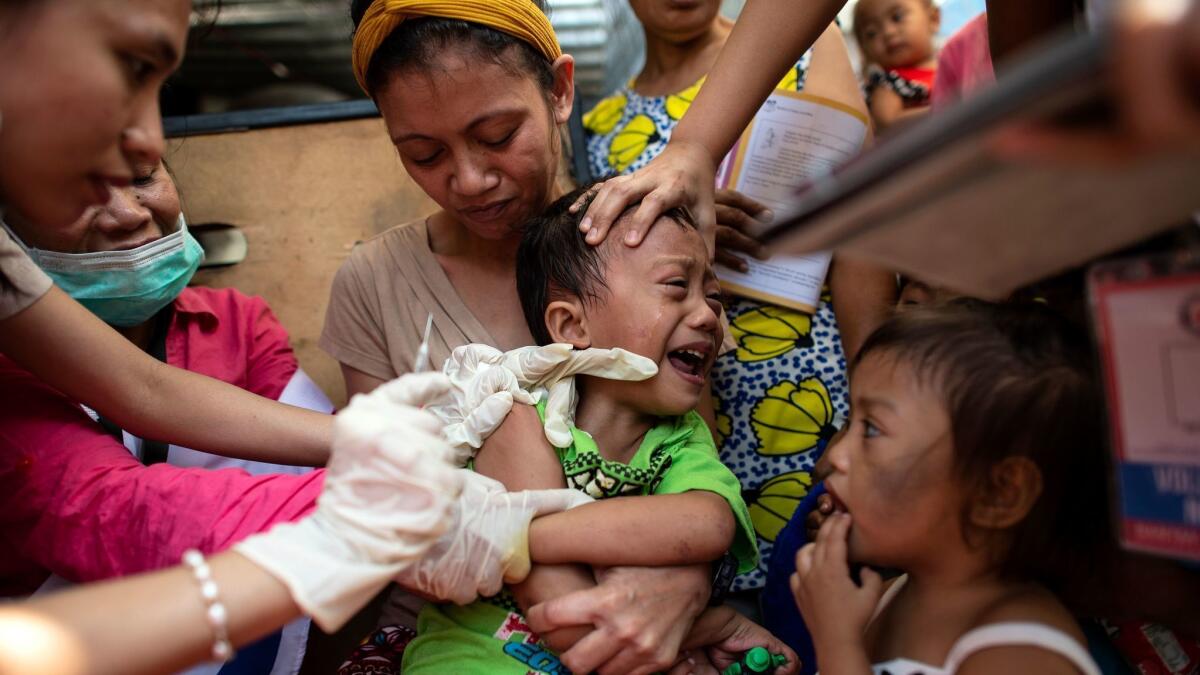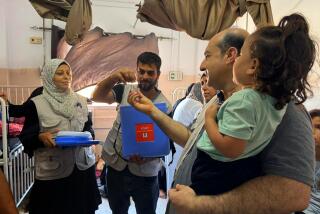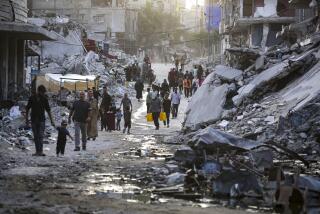Philippine measles outbreak fed by distrust of vaccines – rooted in vaccination scandal

Reporting from MANILA — The 3-year-old boy squirmed in his mother’s arms, an IV drip unspooling from his wrist, his skin flush with a pale pink rash.
As a doctor struggled to put an inhaler between the boy’s blistered lips to calm his coughing, his mother, Norayah Cabugatan, explained how she had resisted vaccinating her son and his two siblings against measles.
The measles virus, with its rash and often high fever, may cause dangerous complications. But Cabugatan had been spooked by the idea of a vaccine, having heard it could have fatal side effects.
“I was scared,” Cabugatan, 32, said during a recent visit to a Manila hospital. “What I’ve heard on TV, it was really scary.”
The boy, Andrew, is among more than 20,000 people, mainly children, who have been infected during a measles outbreak in the Philippines. As of mid-March, about 315 people had died from measles since the start of the year, according to the Philippine Red Cross, compared with 202 people who died of the disease in the country last year.
A driving force behind the outbreak, according to some doctors, health workers and government officials in the Philippines, has been a 2-year-old, politically charged scandal involving a government-led dengue vaccination program that cratered an already wavering confidence in vaccines.
Although it remains unclear whether the program caused any deaths, many parents stopped showing up at medical centers for vaccinations and began turning away health workers offering at-home vaccines. The spread of misinformation and rumors about vaccines was aided by social media, according to some doctors.
Other countries have also seen increases in measles cases, officials said. In the United States, where there is a fervent movement against vaccines, there were 268 recorded cases of measles in the U.S. this year as of March 14, compared with 372 cases during all of 2018, according to the national Centers for Disease Control and Prevention.
“The number of cases of measles and other vaccine-preventable diseases has been going up while vaccination rates are going down. The reason that it is measles first is because measles is the most contagious of the vaccine-preventable diseases,” said Edsel Salvana, an infectious diseases physician at the University of the Philippines, Manila, who has written extensively about the recent outbreak.
“With all the stuff that is going on with anti-vaxxers in the U.S., that kind of gets exported all over the place,” he said in an interview.
The root of the anti-vaccine scare in the Philippines dates to April 2016, when the previous government launched a program to provide a mass vaccine for dengue, a tropical mosquito-borne disease. The government, just a month from a nationwide election, chose Dengvaxia, produced by the French drugmaker Sanofi, for the immunization drive.
The following year, in November, Sanofi announced that the vaccine could lead to severe cases of dengue for people who had not previously contracted the disease. The announcement alarmed parents whose children had been vaccinated, and some politicians and the media linked deaths to the vaccine with little or no evidence.
The vaccine program, under which about 830,000 schoolchildren had received at least one dose of the vaccine, was halted, and the vaccine was later banned.
“People started to panic. There was hysteria andchaos,” said Lulu C. Bravo, executive director of the Philippine Foundation for Vaccination.
At a health center in south Manila, a sprawling city with about 13 million people, vaccination researchers who were not part of the government investigations collected testimony from community health workers describing the hostility they faced when trying to discuss or administer vaccines in light of the Dengvaxia scandal.
ALSO: Manila tries to fix its notorious traffic — bad news for jeepneys and trolley boys »
In one video testimonial, a health worker nervously recounted being confronted by members of a neighborhood where she had worked for years. When she would show up, residents would shout warnings, telling one another other to run away. Some called health workers the “murderers of children,” she said.
The University of the Philippines and Philippine General Hospital investigated the deaths of 14 children linked to Dengvaxia. The formal investigation, which was not connected to the testimony collected by vaccination researchers, found no direct evidence that the vaccine caused any of the 14 deaths. Six cases require further review, investigators said.
Philippine Sen. Richard Gordon, who led an investigation into the dengue vaccine and serves as chairman of the Philippine Red Cross, said Sanofi didn’t have “a sterling record” and accused the company of improper contacts with the past administration.
The Senate investigation last year found former President Benigno Aquino III and other officials from his government liable for violating numerous laws in connection with the procurement and distribution of the Dengvaxia vaccine. The previous government maintained the vaccine program was handled properly, and Sanofi denied any wrongdoing.
“There has been no causal link between any deaths and the vaccine,” Sanofi said in a statement. The company closely monitored the safety of the vaccine and “followed all Philippine laws and regulations with regard to the registration, usage and promotion of the vaccine and we fully cooperated with all investigations into this matter.”
The Philippines banned the vaccine on Feb. 19.
Karen M. Fresco-Tadina, a pediatrician at the Amang Rodriguez Memorial Medical Center, a government-run hospital on the east side of metropolitan Manila where Cabugatan’s son was being treated, said doctors there noticed a surge inmeasles patients beginning in late December and continuing into January.
Fresco-Tadina said the hospital struggled to find space to house patients. An isolation ward meant to house six patients was soon filled with 53 people.
By mid-February, the hospital appealed to the Philippine Red Cross to set up treatment facilities in tents outside, which they did. From the start of the year to March 14, the medical center treated 925 measles patients; 19 of them died. During a normal year, Fresco-Tadina said, doctors would see about 30 measles cases.
“The herd immunity is gone,” she said, using a medical term that refers to vaccination coverage that is extensive enough to prevent a virus from circulating in a community. “There is a distrust of the whole system.”
In a Red Cross tent, which is where Cabugatan obtained treatment for her son, children lay listlessly on cots; others wailed. Cabugatan had gotten her other two children, an 8-month-old daughter and 4-year-old son, vaccinated after Andrew fell ill on March 8. She pleaded with other parents to do the same.
“My advice,” she said, “is, please, get them vaccinated.”
McLaughlin is a special correspondent.
More to Read
Sign up for Essential California
The most important California stories and recommendations in your inbox every morning.
You may occasionally receive promotional content from the Los Angeles Times.










